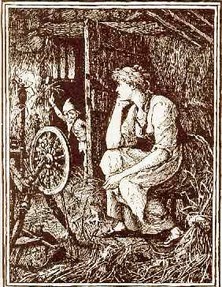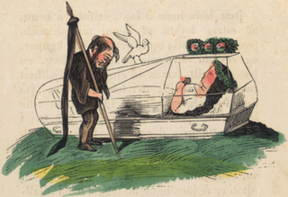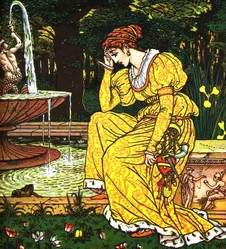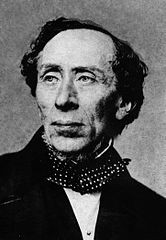8. In Rumpelstilskin we deal with two kinds of promises. First is a miller's claim about his daughter's abilities. He said she can spin gold from straw. King demands a proof and daughter is practically condemned to death.
 Unexpectedly a little man offers his help if she makes a promise on her own. She promises him her unborn son (and she is not even pregnant, so this promise doesn't sound too serious if we think she'll be dead without gold in couple of hours anyway).
Unexpectedly a little man offers his help if she makes a promise on her own. She promises him her unborn son (and she is not even pregnant, so this promise doesn't sound too serious if we think she'll be dead without gold in couple of hours anyway).
But little man (Rumpelstiltskin is his name) keeps his promise, she marries a king and after a year they got a son. Rumpelstiltskin demands a boy and his mother is in serious trouble. Fortunately she manages to make another deal. If she guess little man's name, she can keep the boy. Finally she wins, so she doesn't have to keep her promise.
9. We have similar situation with two promises in the Beauty and the Beast. First is father's promise to send his daughter into Beast's castle in exchange for his life. When she (Beauty) comes and step after step falls in love with the Beast, has to promise to return to the castle after visit to her family.
In her home she becomes a victim of intrigues of her sisters and almost forgets to keep her promise. But love conquers all and Beauty returns soon enough to save his life, break a spell and they live happily ever after.
 10. Less happy is the ending of the Bluebeard. When he leaves the castle, he gives his keys to his wife and she has to promise not to open one specific door. She break her promise and he wants to punish her with beheading.
10. Less happy is the ending of the Bluebeard. When he leaves the castle, he gives his keys to his wife and she has to promise not to open one specific door. She break her promise and he wants to punish her with beheading.
She shows regret but Bluebeard stays merciless. This seems too cruel punishment for her act of curiosity anyway and we as readers are totally satisfied with the ending. Bluebeard, serial killer and unforgiving monster dies and his wife, despite breaking her promise, becomes rich heiress.
Apparently under certain circumstances we can break a promise.
And forgiving can be even more important than keeping one's promise!


 1. Frog Prince, also known as Frog King is typical fairy tale of
1. Frog Prince, also known as Frog King is typical fairy tale of  2.
2.  she has to promise not to stray from the path. Soon after she meets a wolf, she breaks a promise and - her punishment is death.
she has to promise not to stray from the path. Soon after she meets a wolf, she breaks a promise and - her punishment is death. 7. This is very noticeable in the Goose Girl. The princess is forced to make a promise not to tell anybody about her royal origin and than switch identities with her maiden. When the king tries to help her, she can't tell the truth, because she promised 'not to tell any living soul'.
7. This is very noticeable in the Goose Girl. The princess is forced to make a promise not to tell anybody about her royal origin and than switch identities with her maiden. When the king tries to help her, she can't tell the truth, because she promised 'not to tell any living soul'. Unexpectedly a little man offers his help if she makes a promise on her own. She promises him her unborn son (and she is not even pregnant, so this promise doesn't sound too serious if we think she'll be dead without gold in couple of hours anyway).
Unexpectedly a little man offers his help if she makes a promise on her own. She promises him her unborn son (and she is not even pregnant, so this promise doesn't sound too serious if we think she'll be dead without gold in couple of hours anyway). 10. Less happy is the ending of the Bluebeard. When he leaves the castle, he gives his keys to his wife and she has to promise not to open one specific door. She break her promise and he wants to punish her with beheading.
10. Less happy is the ending of the Bluebeard. When he leaves the castle, he gives his keys to his wife and she has to promise not to open one specific door. She break her promise and he wants to punish her with beheading.

 Vintage Postcard Artists with 10 Examples of Easter Cardson 02/21/2025
Vintage Postcard Artists with 10 Examples of Easter Cardson 02/21/2025
 Valentine's Symbolson 01/23/2025
Valentine's Symbolson 01/23/2025
 Thanksgiving Symbolson 11/12/2024
Thanksgiving Symbolson 11/12/2024
 Famous Witches in Literary Historyon 10/06/2024
Famous Witches in Literary Historyon 10/06/2024


Do you keep your promises?
Fairy tales follow the premise that older generation should serve as a role model to the younger ones. Ene with bad examples (nobody is too bad to be used at least as a bad example).
It's interesting that some promises demand keeping as is even as others furnish some subsequent modifications.
Is the fairy-tale promise configuration generally stricter if not harsher on older promisees/promisers and on stepchildren and their parents than on younger promisees/promisers and on first-marriage children and their first-marriage parents?
Good point, DerdriuMarriner. The authoritative (and positive) father is not so often in fairy tales, but we can still find a few examples (like in The Goose Girl). More often we deal with incompetent fathers, dying fathers, and especially absent fathers (what was reality of Jacob and William Grimm).
It's interesting that the princess' father, though king, feels that his daughter must keep her promises, even to an animal sentient.
In a somewhat related, somewhat unrelated direction, is it likelier in fairy tales that a father or male authority figure would think along those lines?
It seems, as I've mentioned elsewhere on your fairy tale-related wizzleys, that fairy tales likelier have a bad mother/stepmother than a bad father/stepfather.
Well said, WriterArtist. Maybe this calls for another article?
There is another aspect of promise - pertaining to moral obligations and duties. The promises that need to be kept for one's own satisfaction and there is no compulsion from other side.
Thanks, Mira:)
How very interesting! I really enjoy your articles on fairy tales.
Good point, WriterArtist, guilt can be interesting theme too.
Wow - these are some beautiful tales of promises kept and broken. You have brought this subject in an interesting way. Coming to me, if I made a promise to someone, I would like to adhere otherwise I keep feeling guilty.